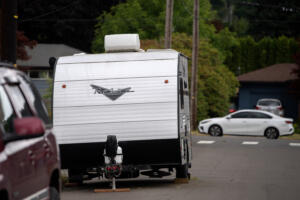The Washington Department of Ecology has thrown a wrench into Millennium Bulk Terminals’ hopes of building the largest coal export terminal in North America, possibly killing a plan that would add 16 slow-moving, 1.3-mile-long coal trains to Camas-Washougal rail lines each day.
The state DOC this week denied a water quality permit sought by Millennium Bulk Terminals to construct a coal export terminal on a 190-acre site in Longview, Washington.
If approved, the project would bring 44 million tons of coal to Washington State each year, via coal trains carrying the coal from Montana, Wyoming, Utah and Colorado and delivering it to the Longview export terminal. From Longview, the coal would be shipped on boats, adding 1,680 new vessel trips to the Columbia River each year — nearly 25 percent of all Columbia River traffic.
According to a DOE press release, the department denied the permit because they felt the terminal would cause “significant and unavoidable harm to nine environmental areas” including air quality, vehicle and vessel traffic, rail capacity and safety, noise pollution, and cultural, social and tribal resources.
“After extensive study and deliberation, I am denying Millennium’s proposed coal export project,” Ecology Director Maia Bellon stated in the press release. “There are simply too many unavoidable and negative environmental impacts for the project to move forward.”
To proceed with the coal terminal plan, Millennium needs to fill wetland areas and dredge the nearby riverbed. To do this, the company first needs to garner the necessary water permits. The company could appeal the DOE’s decision to the state’s Environmental and Land Use Hearings Office.
An environmental report on the proposed Millennium Bulk Terminals coal-by-rail project released in April found “adverse impacts” in 19 of the 23 environmental study areas.
The in-depth report, completed by Cowlitz County and the Washington Department of Ecology, relied on scientific methods, computer models and data to evaluate potential environmental impacts of the proposed coal-by-rail terminal. The report found that the coal terminal project would lead to: An increase in locomotive diesel particulate matter, a toxic air pollutant, which “is expected to cause an unavoidable increase in cancer risk rates in a neighborhood along the rail line in Longview, (Washington);” traffic jams during peak commute times in Cowlitz County due to slow-moving trains; and an increase in greenhouse gas emissions by about 2 million metric tons due to the transporting, handling and burning the coal overseas.
State denies critical permit, throws wrench in coal terminal plan
Proposed Millennium project would bring 16 slow-moving, 1.3-mile-long coal trains through Camas-Washougal every day
- By Kelly Moyer
-
September 26, 2017 1:55 pm
-
News




